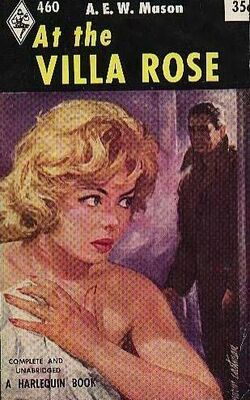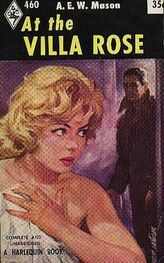"Yes," said Ricardo. "Helene Vauquier made a slip there. She should have given her a false name."
Hanaud nodded.
"It is the one slip she made in the whole of the business. Nor did she recover herself very cleverly. For when the Commissaire pounced upon the name, she at once modified her words. She only thought now that the name was Adele, or something like it. But when I went on to suggest that the name in any case would be a false one, at once she went back upon her modifications. And now she was sure that Adele was the name used. I remembered her hesitation when I read Marthe Gobin’s letter. They helped to confirm me in my theory that she was in the plot; and they made me very sure that it was an Adele for whom we had to look. So far well. But other statements in the letter puzzled me. For instance, 'She ran lightly and quickly across the pavement into the house, as though she were afraid to be seen.' Those were the words, and the woman was obviously honest. What became of my theory then? The girl was free to run, free to stoop and pick up the train of her gown in her hand, free to shout for help in the open street if she wanted help. No; that I could not explain until that afternoon, when I saw Mlle. Celie’s terror-stricken eyes fixed upon that flask, as Lemerre poured a little out and burnt a hole in the sack. Then I understood well enough. The fear of vitriol!" Hanaud gave an uneasy shudder. "And it is enough to make any one afraid! That I can tell you. No wonder she lay still as a mouse upon the sofa in the bedroom. No wonder she ran quickly into the house. Well, there you have the explanation. I had only my theory to work upon even after Mme. Gobin’s evidence. But as it happened it was the right one. Meanwhile, of course, I made my inquiries into Wethermill’s circumstances. My good friends in England helped me. They were precarious. He owed money in Aix, money at his hotel. We knew from the motor-car that the man we were searching for had returned to Aix. Things began to look black for Wethermill. Then you gave me a little piece of information."
"I!" exclaimed Ricardo, with a start.
"Yes. You told me that you walked up to the hotel with Harry Wethermill on the night of the murder and separated just before ten. A glance into his rooms which I had-you will remember that when we had discovered the motor-car I suggested that we should go to Harry Wethermill’s rooms and talk it over-that glance enabled me to see that he could very easily have got out of his room on to the verandah below and escaped from the hotel by the garden quite unseen. For you will remember that whereas your rooms look out to the front and on to the slope of Mont Revard, Wethermill’s look out over the garden and the town of Aix. In a quarter of an hour or twenty minutes he could have reached the Villa Rose. He could have been in the salon before half-past ten, and that is just the hour which suited me perfectly. And, as he got out unnoticed, so he could return. So he did return! My friend, there are some interesting marks upon the window-sill of Wethermill’s room and upon the pillar just beneath it. Take a look, M. Ricardo, when you return to your hotel. But that was not all. We talked of Geneva in Mr. Wethermill’s room, and of the distance between Geneva and Aix. Do you remember that?"
"Yes," replied Ricardo.
"Do you remember too that I asked him for a road-book?"
"Yes; to make sure of the distance. I do."
"Ah, but it was not to make sure of the distance that I asked for the road-book, my friend. I asked in order to find out whether Harry Wethermill had a road-book at all which gave a plan of the roads between here and Geneva. And he had. He handed it to me at once and quite naturally. I hope that I took it calmly, but I was not at all calm inside. For it was a new road-book, which, by the way, he bought a week before, and I was asking myself all the while-now what was I asking myself, M. Ricardo?"
"No," said Ricardo, with a smile. "I am growing wary. I will not tell you what you were asking yourself, M. Hanaud. For even were I right you would make out that I was wrong, and leap upon me with injuries and gibes. No, you shall drink your coffee and tell me of your own accord."
"Well," said Hanaud, laughing, "I will tell you. I was asking myself: 'Why does a man who owns no motor-car, who hires no motor-car, go out into Aix and buy an automobilist’s road-map? With what object?' And I found it an interesting question. M. Harry Wethermill was not the man to go upon a walking tour, eh? Oh, I was obtaining evidence. But then came an overwhelming thing-the murder of Marthe Gobin. We know now how he did it. He walked beside the cab, put his head in at the window, asked, 'Have you come in answer to the advertisement?' and stabbed her straight to the heart through her dress. The dress and the weapon which he used would save him from being stained with her blood. He was in your room that morning, when we were at the station. As I told you, he left his glove behind. He was searching for a telegram in answer to your advertisement. Or he came to sound you. He had already received his telegram from Hippolyte. He was like a fox in a cage, snapping at every one, twisting vainly this way and that way, risking everything and every one to save his precious neck. Marthe Gobin was in the way. She is killed. Mlle. Celie is a danger. So Mile. Celie must be suppressed. And off goes a telegram to the Geneva paper, handed in by a waiter from the cafe at the station of Chambery before five o’clock. Wethermill went to Chambery that afternoon when we went to Geneva. Once we could get him on the run, once we could so harry and bustle him that he must take risks-why, we had him. And that afternoon he had to take them."
"So that even before Marthe Gobin was killed you were sure that Wethermill was the murderer?"
Hanaud’s face clouded over.
"You put your finger on a sore place, M. Ricardo. I was sure, but I still wanted evidence to convict. I left him free, hoping for that evidence. I left him free, hoping that he would commit himself. He did, but-well, let us talk of some one else. What of Mlle. Celie?"
Ricardo drew a letter from his pocket.
"I have a sister in London, a widow," he said. "She is kind. I, too, have been thinking of what will become of Mlle. Celie. I wrote to my sister, and here is her reply. Mlle. Celie will be very welcome."
Hanaud stretched out his hand and shook Ricardo’s warmly.
"She will not, I think, be for very long a burden. She is young. She will recover from this shock. She is very pretty, very gentle. If-if no one comes forward whom she loves and who loves her-I-yes, I myself, who was her papa for one night, will be her husband forever."
He laughed inordinately at his own joke; it was a habit of M. Hanaud’s. Then he said gravely:
"But I am glad, M. Ricardo, for Mlle. Celie’s sake that I came to your amusing dinner-party in London."
Mr. Ricardo was silent for a moment. Then he asked:
"And what will happen to the condemned?"
"To the women? Imprisonment for life."
"And to the man?"
Hanaud shrugged his shoulders.
"Perhaps the guillotine. Perhaps New Caledonia. How can I say? I am not the President of the Republic."







